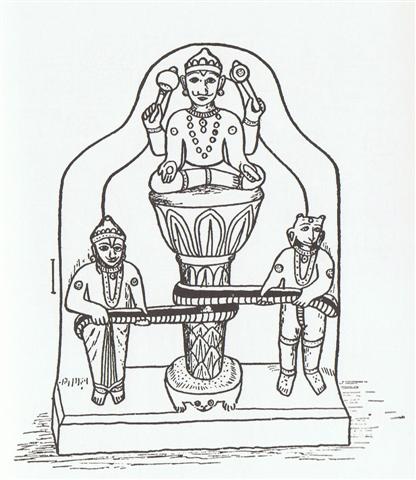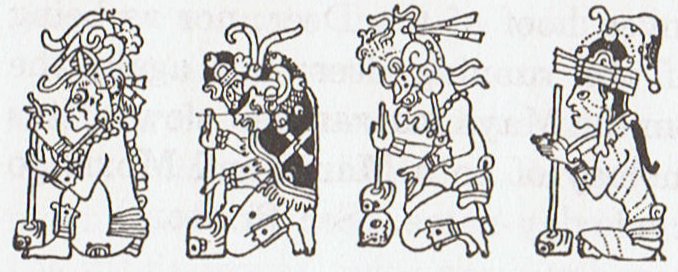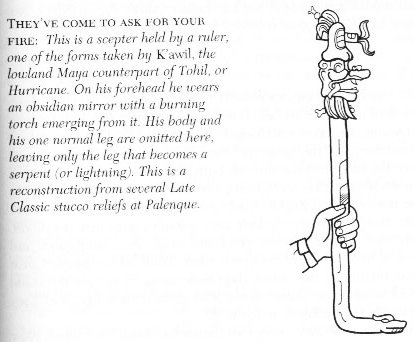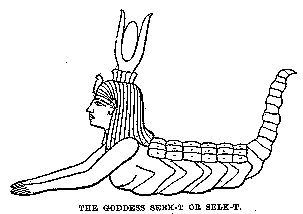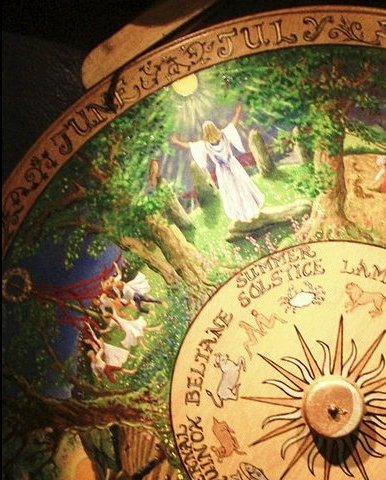29. We should consider the possibility that the heat associated with Antares was thought of as originating from the friction of a fast whirling around of a kind of 'foot', a fire-drill: ... Antares, visible in the morning sky of December-January, came to stand for summer heat; hence the saying, 'Rehua cooks (ripens) all fruit' [hakatupu]. The generally accepted version of the Rehua myth, according to Best, is that Rehua had two wives, the stars on either side of Antares. One was Ruhi-te-rangi or Pekehawani, the personification of summer languor (ruhi), the other Whaka-onge-kai, She-who-makes-food-scarce before the new crops can be harvested ... ... That there is a whirlpool in the sky is well known, it is most probably the essential one, and it is precisely located. It is a group of stars so named (zalos) at the foot of Orion, close to Rigel (beta Orionis, Rigel being the Arabic word for 'foot'), the degree of which was called 'death', according to Hermes Trismegistos, whereas the Maori claim outright that Rigel marked the way to Hades (Castor indicating the primordial homeland) ...
And there seems to have been more than one such 'fire drill'.
... They walked in crowds when they arrived at Tulan, and there was no fire. Only those with Tohil had it: this was the tribe whose god was first to generate fire. How it was generated is not clear. Their fire was already burning when Jaguar Quitze and Jaguar Night first saw it: 'Alas! Fire has not yet become ours. We'll die from the cold', they said. And then Tohil spoke: 'Do not grieve. You will have your own even when the fire you're talking about has been lost', Tohil told them. 'Aren't you a true god! Our sustenance and our support! Our god!' they said when they gave thanks for what Tohil had said. 'Very well, in truth, I am your god: so be it. I am your lord: so be it,' the penitents and sacrificers were told by Tohil. And this was the warming of the tribes. They were pleased by their fire. After that a great downpour began, which cut short the fire of the tribes. And hail fell thickly on all the tribes, and their fires were put out by the hail. Their fires didn't start up again. So then Jaguar Quitze and Jaguar Night asked for their fire again: 'Tohil, we'll be finished off by the cold', they told Tohil. 'Well, do not grive', said Tohil. Then he started a fire. He pivoted inside his sandal ...
To my mind comes the name Rigil Kent, and after looking around for a while I can find support in my old astronomy book, which states (my translation from the Swedish language): "α Centauri = Toliman, 'the shoot from the vine', also named Rigel Centauri, 'the Foot of the Centaur'. Both names are connected to the centaurs of Greek mythology, 'horse men', usually depicted as creatures with the upper torso of a man who below the waist was transformed into the body of a horse. In his hand the centaur held a staff twined around by a grape-vine." Therefore, I suggest, the star Toliman could have been connected with something whirling around similar to the whirlpool close to Rigel Orionis. Hiro. 1. A deity invoked when praying for rain (meaning uncertain). 2. To twine tree fibres (hauhau, mahute) into strings or ropes. Ohirohiro, waterspout (more exactly pú ohirohiro), a column of water which rises spinning on itself. Vanaga. To spin, to twist. P Mgv.: hiro, iro, to make a cord or line in the native manner by twisting on the thigh. Mq.: fió, hió, to spin, to twist, to twine. Ta.: hiro, to twist. This differs essentially from the in-and-out movement involved in hiri 2, for here the movement is that of rolling on the axis of length, the result is that of spinning. Starting with the coir fiber, the first operation is to roll (hiro) by the palm of the hand upon the thigh, which lies coveniently exposed in the crosslegged sedentary posture, two or three threads into a cord; next to plait (hiri) three or other odd number of such cords into sennit. Hirohiro, to mix, to blend, to dissolve, to infuse, to inject, to season, to streak with several colors; hirohiro ei paatai, to salt. Hirohiroa, to mingle; hirohiroa ei vai, diluted with water. Churchill. Ta.: Hiro, to exaggerate. Ha.: hilohilo, to lengthen a speech by mentioning little circumstances, to make nice oratorial language. Churchill. Whiro 'Steals-off-and-hides'; also [in addition to the name of Mercury] the universal name for the 'dark of the Moon' or the first day of the lunar month; also the deity of sneak thieves and rascals. Makemson. It might have been depicted as a vine of smoke going around and around and upwards, eventually producing raindrops (grapes), in contrast to a whirlpool where everything would go around and around, eventually disappearing downwards.
... It was 4 August 1968, and it was the feast day of Saint Dominic, patron of Santo Domingo Pueblo, southwest of Santa Fe. At one end of the hot, dusty plaza, a Dominican priest watched nervously as several hundred dancers arranged in two long rows pounded the earth with their moccasined feet as a mighty, collective prayer [ui] for rain, accompanied by the powerful baritone singing of a chorus and the beat of drums. As my family and I viewed this, the largest and in some ways the most impressive Native American public ceremony, a tiny cloud over the Jémez Mountains to the northwest got larger and larger, eventually filling up the sky; at last the storm broke, and the sky was crisscrossed by lightning and the pueblo resounded with peals of rolling thunder ... Notably there was one foot at Toliman (Rigel Centauri, α = Serk-t) and another foot at the Barking Dog (Rijl al Al Awwā, μ Virginis).
Va'e: Foot, leg; te va'e mata'u, te va'e maúi, right foot, left foot. Va'e ruga, va'e raro, quick and light, without detour (lit.: foot up, foot down). Ka-oho koe ki a nua era va'e ruga va'e raro, ina ekó hipa-hipa, hurry straight to your mother, do not make any detours. Va'e pau, misshapen foot, clubfoot. Vae, to choose. Vaega, middle, centre; i vaega o, in the middle of. Vanaga. 1. Foot, paw, leg, limb; vae no roto, drawers; karikari vae, ankle. P Pau.: vaevae, foot, leg. Mgv.: vaevae, id. Mq.: vae, id. Ta.: vaevae, avae, id. 2. Pupil. 3. To choose, elect, prefer, promote, vote; vavae, to destine, to choose; vaea (vae 2), pupil. Vaeahatu (vae 1 - ahatu): moe vaeahatu, to sleep sprawling with legs extended. Vaega, center, middle, within, half; o vaega, younger; ki vaega, among, between, intermediate. P Pau.: vaega, the middle. Mgv.: vaega, center, middle. Mq.: vaena, vavena, vaveha, id. Ta.: vaehaa, half. Vaehakaroa (vae 1 - roa): moe vaehakaroa, to sleep with legs stretched out. Vaehau (vae 1 - hau 3), pantaloons, trousers. Vaeherehere (vae 1 - here 1), to attach by the paw. Vaerere (vae 1 - rere 1), to run. Churchill. Ta.: 1. Timbers of a boat. Ha.: wae, knees, side timbers of a boat. 2. To share out. Sa.: vae, to divide, to share. Ma.: wawae, to divide. Churchill.
|
|||||||||||||||||||||||||||||||||||||||||||||||||||||||||||||||||||||||
